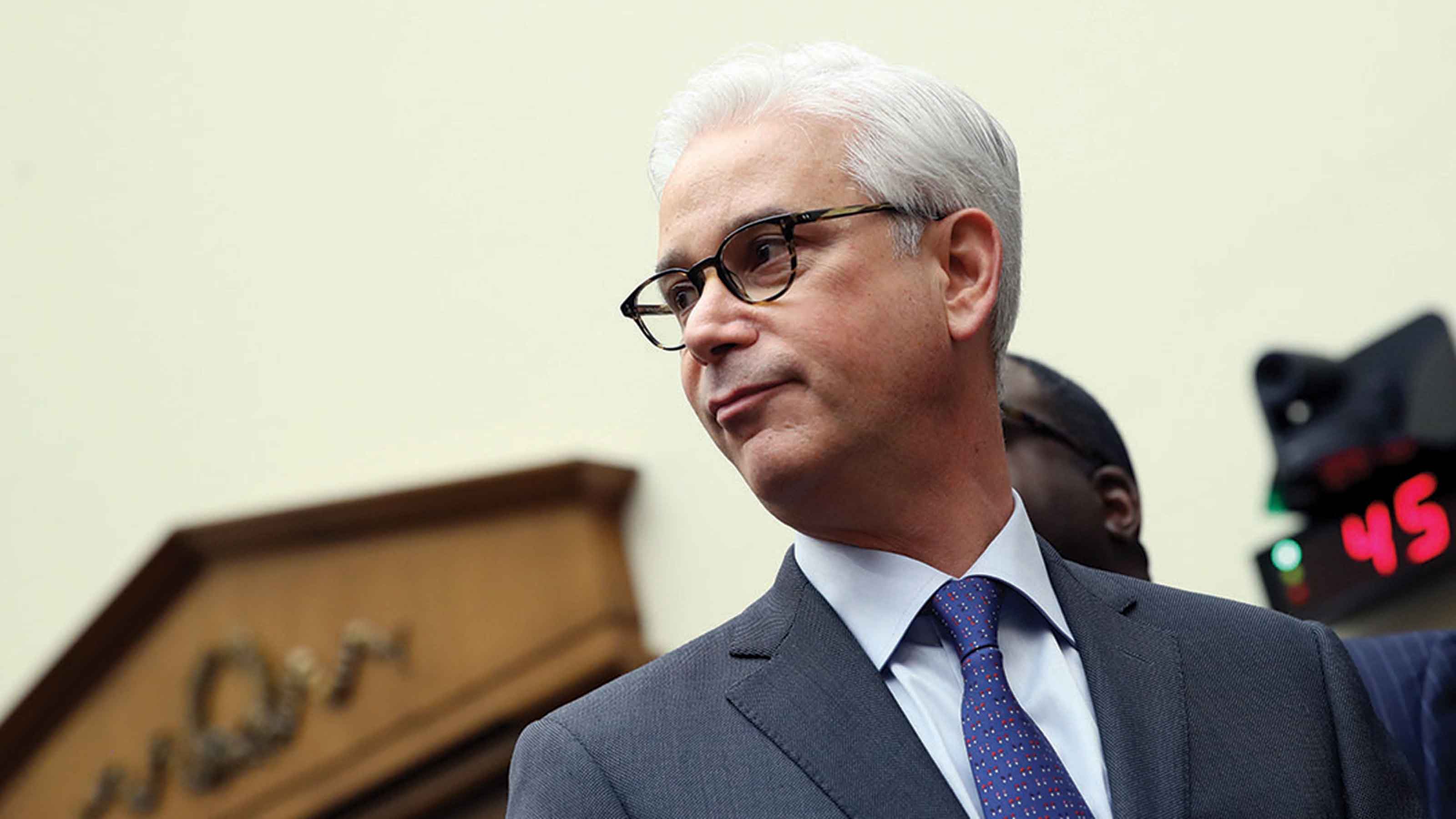Should Execs Return Bonuses They Don’t Merit?
Getting ill-gotten gains returned to shareholders remains the exception, not the rule.

Profit and prosper with the best of Kiplinger's advice on investing, taxes, retirement, personal finance and much more. Delivered daily. Enter your email in the box and click Sign Me Up.
You are now subscribed
Your newsletter sign-up was successful
Want to add more newsletters?

Delivered daily
Kiplinger Today
Profit and prosper with the best of Kiplinger's advice on investing, taxes, retirement, personal finance and much more delivered daily. Smart money moves start here.

Sent five days a week
Kiplinger A Step Ahead
Get practical help to make better financial decisions in your everyday life, from spending to savings on top deals.

Delivered daily
Kiplinger Closing Bell
Get today's biggest financial and investing headlines delivered to your inbox every day the U.S. stock market is open.

Sent twice a week
Kiplinger Adviser Intel
Financial pros across the country share best practices and fresh tactics to preserve and grow your wealth.

Delivered weekly
Kiplinger Tax Tips
Trim your federal and state tax bills with practical tax-planning and tax-cutting strategies.

Sent twice a week
Kiplinger Retirement Tips
Your twice-a-week guide to planning and enjoying a financially secure and richly rewarding retirement

Sent bimonthly.
Kiplinger Adviser Angle
Insights for advisers, wealth managers and other financial professionals.

Sent twice a week
Kiplinger Investing Weekly
Your twice-a-week roundup of promising stocks, funds, companies and industries you should consider, ones you should avoid, and why.

Sent weekly for six weeks
Kiplinger Invest for Retirement
Your step-by-step six-part series on how to invest for retirement, from devising a successful strategy to exactly which investments to choose.
Q. I own stock in a company that saw its share price plunge after previously hidden problems came to light, resulting in a restatement of earnings for two previous years. The CEO apologized and took “full responsibility” for not knowing about all this, but he and other executives haven’t offered to return any of the huge bonuses they got when the stock was flying high. Your thoughts, please.
SEE ALSO: The Money and Ethics Quiz
A. I would like to see senior executives in such situations offer truly voluntary restitution, which is what "taking responsibility" should mean. But this almost never happens. Even the seemingly voluntary giveback of bonuses by a few executives at AIG -- bailed out by U.S. taxpayers in 2008 -- occurred in the glare of negative publicity.
From just $107.88 $24.99 for Kiplinger Personal Finance
Become a smarter, better informed investor. Subscribe from just $107.88 $24.99, plus get up to 4 Special Issues

Sign up for Kiplinger’s Free Newsletters
Profit and prosper with the best of expert advice on investing, taxes, retirement, personal finance and more - straight to your e-mail.
Profit and prosper with the best of expert advice - straight to your e-mail.
Under federal mandates (Sarbanes-Oxley, and soon, Dodd-Frank), most publicly traded companies today have "clawback" provisions in their executive employment contracts, enabling their boards to seek return of past pay when things go seriously wrong.
But boards rarely initiate this -- a sign of their being too cozy with senior managers, their supposed servants. Most cases of restitution have resulted from Securities and Exchange Commission action ($468 million from the former head of UnitedHealth Group), criminal prosecution (against Tyco's former CEO, for example) or the threat of protracted civil litigation (the recent $104 million settlement with former partners of law firm Dewey & LeBoeuf). Huge trading losses at UBS and JPMorgan Chase are likely to trigger clawback rules at those banks, but it's unclear how far up the executive ladder the restitution will go.
Most corporations try to avoid the acrimony of forced clawbacks by not paying cash bonuses after the books close each year. Instead, they use a variety of deferral methods -- restricted stock and options that can't be sold or exercised for several years, or cash bonuses paid into accounts that can't be tapped for several years and can be docked if an executive's actions are later found to have caused big losses.
These are small steps in the right direction.
Research was performed by editorial intern Ted Leonhardt from Duke University. Have a money-and-ethics question you'd like answered? Write to editor in chief Knight Kiplinger at ethics@kiplinger.com.
This article first appeared in Kiplinger's Personal Finance magazine. For more help with your personal finances and investments, please subscribe to the magazine. It might be the best investment you ever make.
Profit and prosper with the best of Kiplinger's advice on investing, taxes, retirement, personal finance and much more. Delivered daily. Enter your email in the box and click Sign Me Up.

Knight came to Kiplinger in 1983, after 13 years in daily newspaper journalism, the last six as Washington bureau chief of the Ottaway Newspapers division of Dow Jones. A frequent speaker before business audiences, he has appeared on NPR, CNN, Fox and CNBC, among other networks. Knight contributes to the weekly Kiplinger Letter.
-
 How Much It Costs to Host a Super Bowl Party in 2026
How Much It Costs to Host a Super Bowl Party in 2026Hosting a Super Bowl party in 2026 could cost you. Here's a breakdown of food, drink and entertainment costs — plus ways to save.
-
 3 Reasons to Use a 5-Year CD As You Approach Retirement
3 Reasons to Use a 5-Year CD As You Approach RetirementA five-year CD can help you reach other milestones as you approach retirement.
-
 Your Adult Kids Are Doing Fine. Is It Time To Spend Some of Their Inheritance?
Your Adult Kids Are Doing Fine. Is It Time To Spend Some of Their Inheritance?If your kids are successful, do they need an inheritance? Ask yourself these four questions before passing down another dollar.
-
 Airbnb Host Tells What It's Like
Airbnb Host Tells What It's LikeBusiness Costs & Regulation This Denver pharmacist began booking her ski condo a few months after the pandemic hit.
-
 Tough Times for a Family Business
Tough Times for a Family BusinessBusiness Costs & Regulation His dry-cleaning operation was rocked by the pandemic, but he is staying optimistic.
-
 IRS Gives Truckers a Tax Break in Response to the Colonial Pipeline Shutdown
IRS Gives Truckers a Tax Break in Response to the Colonial Pipeline ShutdownTax Breaks The tax penalty for using dyed diesel fuel for highway use is temporarily suspended.
-
 Reliving a Harlem Renaissance
Reliving a Harlem RenaissanceBusiness Costs & Regulation After a tough winter, two sisters look forward to reviving their restaurant’s business.
-
 Add a VPN to Surf the Internet Safely
Add a VPN to Surf the Internet SafelyTechnology To help you fight identity theft, consider adding a VPN.
-
 Stephanie Creary: Making the Case for Diversity on Corporate Boards
Stephanie Creary: Making the Case for Diversity on Corporate BoardsBusiness Costs & Regulation Adding underrepresented voices can improve a company’s bottom line.
-
 How We Lose When We Overlook Black Talent
How We Lose When We Overlook Black TalentBusiness Executives Comments from Wells Fargo CEO Charles Scharf (pictured) reflect a culture that tramples on clients’ trust and limits opportunities for people of color.
-
 Retirees, Create An Emergency Fund for Rental Property
Retirees, Create An Emergency Fund for Rental PropertyBusiness Costs & Regulation Build a cushion to protect your income from an unforeseen crisis.